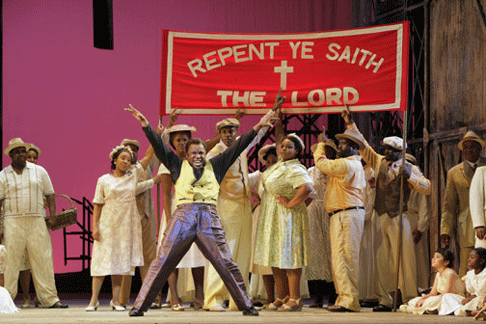Maybe even some Americans were lucky enough to see the 1986 Glyndebourne production or its 1993 televised version, fabled as the best Porgy ever. Thus, with some help from its several Broadway-type attempts, the Gershwin Porgy has become a sing-along — we know every word and every note.
The San Francisco performances are a reprise of the 2005 Washington Opera production directed by Francesca Zambello, a production that has recently stopped off at the operas of Los Angeles and Chicago as well. Ms. Zambello is a noted director of large-scale opera, the Ring currently underway at the San Francisco and Washington operas, and War and Peace at the Seattle and Metropolitan operas, Billy Budd at Covent Garden as examples.
Mounting a Porgy is no small task, it has a huge cast, nine principal singers, sixteen named and solo roles that derive from an ensemble in San Francisco of forty-six [!] Black singers, not to mention three White speaking roles. Three (or more) fight scenes must be staged, plus three (or more) production numbers must be choreographed. It is scored for a full symphony orchestra that wails with the sonic abandon of big band. Can Porgy be crushed under its own weight?
The answer is an emphatic yes! Putting Porgy in the charge of a big time opera director, albeit a theatrically and operatically savvy one, magnified its weight, as did the absolute top operatic quality of its protagonists and ensemble singers (do not say chorus) placed in the hands of John DeMain, the world’s most experienced Porgy conductor. And all this thrust onto a major American opera stage where it is in de facto competition with the sophisticated operas of Benjamin Britten (maybe its closest foreign relative), not to mention the verismo of Puccini.
The end result of all this operatic know how simply lays bare the weaknesses of this Gershwin masterpiece. It does not know if it is an opera of sorts or a Broadway musical, and there is simply too much of it. Its original four hours were mercifully reduced to three hours fifteen minutes in this production, however its original two intermissions were reduced to one, making each of the two parts nearly an hour and a half. One might have preferred the longer version, but in three parts, i.e. a second pit stop. It was a long haul.
 Chauncey Packer (Sportin’ Life) [Photo by Cory Weaver courtesy of San Francisco Opera]
Chauncey Packer (Sportin’ Life) [Photo by Cory Weaver courtesy of San Francisco Opera]
The decision to unify its disparate stories and elements within the confines of a single unit set was a laudable, theatrically valid solution to objectify Gershwin’s well crafted dramatic structure, but it also brought visual boredom. The intimacy needed to make small scale, essentially jazz based vocals real was lost in the vast spaces of the omnipresent two level Catfish Row with a monumental warehouse door stage left (Jake’s fishing boat was pushed in and out from here as was the interior of Porgy’s hovel). Several extraordinary moments though stand out in this generally solid staging, the Kittiwah Island departure as one example, the hurricane, and particularly the moment when Bess, high on heroin is seduced by Sportin’ Life.
Strangely moving was the sense that Gershwin’s Blacks, the 1930’s Blacks, have become not only mainstream American culture but are fully realized performers of international musical arts, led in opera by some of our greatest Porgy interpreters, like Willard White (the Glyndebourne Porgy) and a host of others. The cast for the San Francisco production gave convincing if not definitive performances, led by the Porgy of baritone Eric Owens who bestowed elegant phrasing onto Gershwin’s lines. Laquita Mitchell gave a moving and real performance, vocally and physically, as Bess. Once past mourning Sammy Davis, Jr., Chauncey Packer delivered the goods as Sportin’ Life. We wanted more physical and sexual charisma from the Crown played by Lester Lynch, and in general more distinct personalities from the other principal singers as well.
The underpinnings of Porgy are humble. It is an intimate, uncomplicated story of love and lust in an ambience of poverty well known to operatic verismo, though in Porgy there are no issues, no complaint of injustice, no philosophic formulation of fate, and finally only desperate hope. It can be and is everyone’s story at distinct moments in human history. The challenge is to create an atmosphere for this humility in what is, pure and simple, an extravagant art form, and it was here that this production failed.
The copyright for this American operatic masterpiece (who cares if it has short comings, and is not really stage worthy, at least in this version) expires in 2012. The iron fist exercised by the Gershwin family over its productions will relax, the stiff royalty fees will no longer inhibit production, the insistence that its actors be black and that its locales be specific will no longer hold. Producers will be able to experiment with making this document of main-stream American culture (hardly Black-American culture) into viable theater.
Michael Milenski
Click here for a photo gallery of this production.
![Laquita Mitchell (Bess) and Eric Owens (Porgy) [Photo by Terrence McCarthy courtesy of San Francisco Opera]](http://www.operatoday.com/Porgy_SFO.gif)
